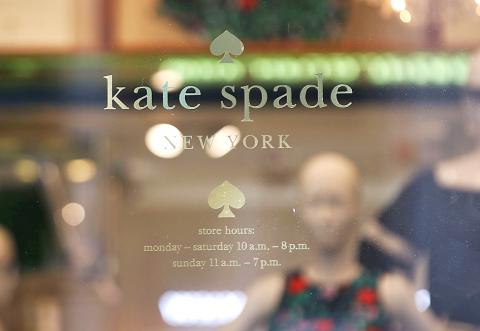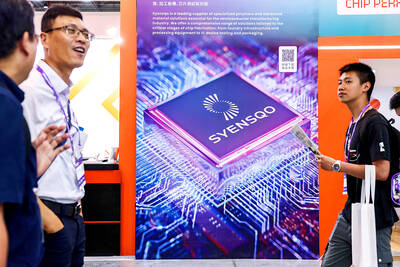Coach Inc’s US$2.4 billion acquisition of rival Kate Spade & Co is part of its broader push for fatter profit margins, even if that means settling for lower sales.
As it prepares to take over the handbag maker and revamp its supply chain, Coach indicated that it would pull Kate Spade merchandise from some retailers and so-called flash-sale sites, echoing a strategy it has already adopted for its own brand of luxury goods.
“Near term, it’s definitely going to be painful,” Edward Jones & Co analyst Brian Yarbrough said. “The good thing is, Coach has been through this before and shown they can be successful.”

Photo: AFP
Heavy discounting by wholesale customers has hurt the cachet of brands such as Coach and Kate Spade, which sell mostly through their own stores and online.
To fight back, they are trying to move fewer products through discounters such as TJ Maxx and department stores, which have been slashing prices on luxury handbags to cope with slower mall traffic.
Coach on Monday said it would buy Kate Spade as part of its strategy to build a multi-brand lifestyle company from New York, where both companies are based. Known for its whimsical handbag designs, Kate Spade has been successful at luring millennials, who make up 60 percent of its customers.
Kate Spade had become “too dependent on the overly promotional channels of online flash sales and wholesale disposition,” Coach chief executive officer Victor Luis said.
To boost its own margins, Coach has been adding more handbags to its luxury 1941 line and stepping up store services to draw shoppers who are willing to pay top dollar.
Coach’s comparable-store sales in North America rose 3 percent in the first quarter, the fourth consecutive gain and above the 1.4 percent increase predicted by analysts.
Gross margins expanded 1.9 percentage points year-on-year to 70.9 percent.
Coach has also said sales of items priced at more than US$400 now make up 55 percent of handbag sales in North America, an increase from 40 percent posted during the same period last year. The results, delivered last week, sent the stock surging 11 percent, its biggest daily gain in more than six years.
Coach, Kate Spade and their rival Michael Kors Holdings Ltd still have work to do to whittle down the excess inventory at retailers. Among the three, Coach’s products are currently marked down the most — by an average of 42 percent, mostly on shoes.
That compares with 40 percent at Michael Kors and 36 percent at Kate Spade, according to Edited, a data-analytics company for the fashion industry.

SEMICONDUCTOR SERVICES: A company executive said that Taiwanese firms must think about how to participate in global supply chains and lift their competitiveness Taiwan Semiconductor Manufacturing Co (TSMC, 台積電) yesterday said it expects to launch its first multifunctional service center in Pingtung County in the middle of 2027, in a bid to foster a resilient high-tech facility construction ecosystem. TSMC broached the idea of creating a center two or three years ago when it started building new manufacturing capacity in the US and Japan, the company said. The center, dubbed an “ecosystem park,” would assist local manufacturing facility construction partners to upgrade their capabilities and secure more deals from other global chipmakers such as Intel Corp, Micron Technology Inc and Infineon Technologies AG, TSMC said. It

EXPORT GROWTH: The AI boom has shortened chip cycles to just one year, putting pressure on chipmakers to accelerate development and expand packaging capacity Developing a localized supply chain for advanced packaging equipment is critical for keeping pace with customers’ increasingly shrinking time-to-market cycles for new artificial intelligence (AI) chips, Taiwan Semiconductor Manufacturing Co (TSMC, 台積電) said yesterday. Spurred on by the AI revolution, customers are accelerating product upgrades to nearly every year, compared with the two to three-year development cadence in the past, TSMC vice president of advanced packaging technology and service Jun He (何軍) said at a 3D IC Global Summit organized by SEMI in Taipei. These shortened cycles put heavy pressure on chipmakers, as the entire process — from chip design to mass

People walk past advertising for a Syensqo chip at the Semicon Taiwan exhibition in Taipei yesterday.

NO BREAKTHROUGH? More substantial ‘deliverables,’ such as tariff reductions, would likely be saved for a meeting between Trump and Xi later this year, a trade expert said China launched two probes targeting the US semiconductor sector on Saturday ahead of talks between the two nations in Spain this week on trade, national security and the ownership of social media platform TikTok. China’s Ministry of Commerce announced an anti-dumping investigation into certain analog integrated circuits (ICs) imported from the US. The investigation is to target some commodity interface ICs and gate driver ICs, which are commonly made by US companies such as Texas Instruments Inc and ON Semiconductor Corp. The ministry also announced an anti-discrimination probe into US measures against China’s chip sector. US measures such as export curbs and tariffs